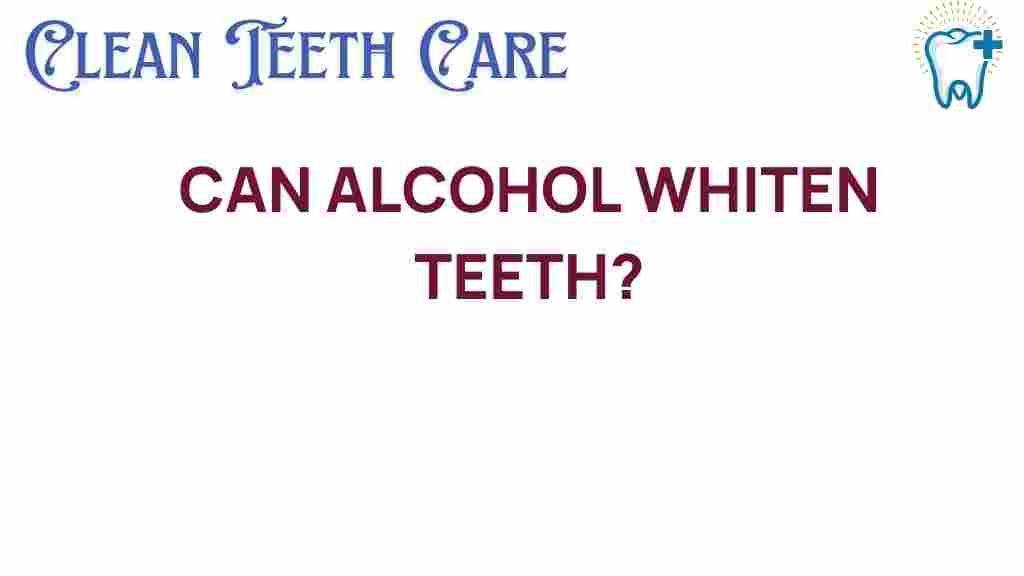Can Alcohol Really Whiten Your Teeth? The Surprising Truth Revealed
When it comes to achieving a brighter smile, many individuals explore various options for teeth whitening. Among the myths surrounding this topic, one that often surfaces is the notion that alcohol can effectively whiten your teeth. This raises important questions about dental health, oral hygiene, and the truth behind common misconceptions. In this article, we will explore the relationship between alcohol and teeth whitening, debunk myths, and provide insight into maintaining a healthy, radiant smile.
Understanding the Myths of Alcohol and Teeth Whitening
Before diving into the facts, it’s essential to understand what people often believe about alcohol and its effects on teeth. Many think that rinsing with alcoholic beverages, such as whiskey or vodka, can help whiten teeth. This belief may stem from the perception that alcohol has antiseptic properties, which might contribute to a cleaner mouth. However, the reality is far more complicated.
- Myth 1: Alcohol can bleach teeth.
- Myth 2: Rinsing with alcohol leads to a brighter smile.
- Myth 3: All alcohol is beneficial for oral hygiene.
These myths can mislead individuals into neglecting proper tooth care practices. Let’s explore the science behind alcohol and its actual impact on dental health.
The Chemical Reality of Alcohol
Alcohol, especially in high concentrations, can act as a solvent. It can break down organic materials, which is why it’s often used in sanitizing solutions. However, this does not translate to whitening teeth. In fact, the use of alcohol products in oral care can have the following effects:
- Enamel Erosion: Alcohol can contribute to the erosion of tooth enamel, making teeth more susceptible to stains and decay.
- Dry Mouth: Alcohol can lead to dry mouth, which reduces saliva production. Saliva is essential for neutralizing acids and washing away food particles.
- Staining: Some alcoholic beverages, particularly red wine and certain cocktails, can actually stain teeth instead of whitening them.
Understanding these points is crucial for anyone seeking to enhance their smile through safe and effective methods.
The Science Behind Effective Teeth Whitening
Now that we’ve dispelled some myths regarding alcohol and teeth whitening, let’s focus on effective methods for achieving a brighter smile. It’s essential to prioritize oral hygiene and maintain a healthy regimen for optimal dental health.
Step-by-Step Guide to Teeth Whitening
Here’s a comprehensive approach to teeth whitening that actually works:
- Consult Your Dentist: Always start with a professional dental check-up. Your dentist can assess your oral health and recommend the best whitening options.
- Choose Professional Whitening Treatments: Options like in-office bleaching or custom take-home kits are effective and safe.
- Over-the-Counter Products: If professional treatments are not an option, consider using ADA-approved whitening toothpaste, strips, or gels.
- Maintain Good Oral Hygiene: Brush twice a day and floss daily to prevent stains. Consider using a whitening mouthwash that does not contain alcohol.
- Limit Staining Foods and Drinks: Reduce consumption of coffee, tea, red wine, and dark sauces that can stain teeth.
- Hydrate: Drink plenty of water to help rinse away food particles and reduce acidity in the mouth.
By following these steps, you can achieve a whiter smile while also promoting dental health.
Natural Teeth Whitening Remedies
In addition to commercial products, there are some natural remedies that may help with smile enhancement:
- Baking Soda: Mix with water to create a paste that can gently scrub away surface stains.
- Hydrogen Peroxide: A natural bleaching agent, but should be used in moderation and diluted.
- Activated Charcoal: Some people use this to absorb stains, but it should be used cautiously to avoid enamel damage.
Always consult with your dentist before trying new whitening methods to ensure they are safe for your teeth.
Troubleshooting Common Teeth Whitening Issues
Even with the best intentions, some may encounter issues when trying to whiten their teeth. Here are some common problems and tips to troubleshoot them:
1. Sensitivity After Whitening
A common side effect of teeth whitening is increased sensitivity. If you experience discomfort:
- Use toothpaste designed for sensitive teeth.
- Limit the frequency of whitening treatments.
2. Uneven Results
If your teeth are not whitening evenly, consider:
- Consulting your dentist for professional treatment.
- Ensuring proper application of any at-home products.
3. Persistent Stains
For stubborn stains that won’t budge:
- Try a stronger professional whitening treatment.
- Discuss alternatives with your dentist, such as veneers or bonding.
Remember that maintaining excellent oral hygiene is key to preventing future staining.
Conclusion: The Real Path to a Brighter Smile
While the idea that alcohol can whiten your teeth may be an appealing myth, the reality is that it can do more harm than good to your dental health. Instead, focus on proven methods of teeth whitening that prioritize safety and effectiveness. By following a proper oral care routine and consulting with dental professionals, you can achieve a bright, confident smile without risking your oral hygiene.
For more information on dental care and effective whitening strategies, check out this link. And remember, your smile is worth the effort!
This article is in the category Treatments and created by CleanTeethCare Team
